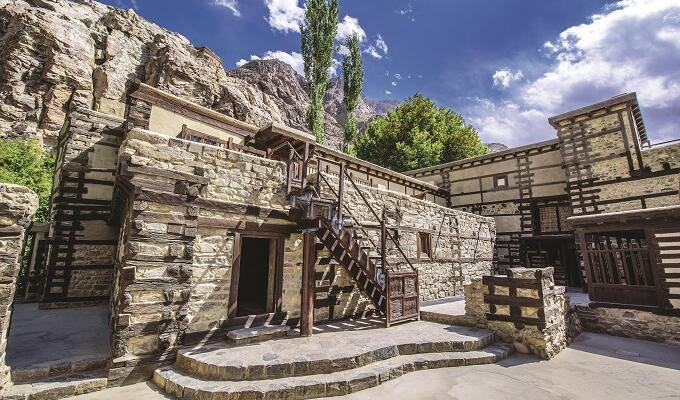

Cultural restoration as a catalyst for development
Reviving ancient mountain communities offers a model of how to pursue sustainable tourism through the prism of heritage conservation
In the wake of the Industrial Revolution, the rise of capitalism and rapid urban expansion, many ancient mountain cultures worldwide were threatened with oblivion.
Development agencies, working to reduce poverty, have tried various approaches, from top-down and donation models to participatory approaches, with varying success.
A unique model adopted by the Aga Khan Development Network, working for sustainable development in the Gilgit-Baltistan region of Northern Pakistan, has proven to be a story of triumph and reclamation by using cultural restoration as a catalyst for social and economic development.
Gilgit-Baltistan is separated from the rest of Pakistan by a chasm formed by two high-altitude mountain ranges, the Himalayas and Karakoram. The mountains geographically isolated local communities and created a unique cultural context. Gradually, once-thriving cultures with imposing palaces and forts boasting masterfully intricate woodwork, rich cuisines, and a unique artistic and musical heritage – possibly the long-lost kingdoms of legend, or even Shangri-La – deteriorated and were threatened with obsolescence and extinction. In 1979, the region, long ago connected by the ancient Silk Road, was again brought into contact with the outside world with the opening of the Karakoram Highway, linking Pakistan to China.
Restoring heritage sites for community impact
The Aga Khan Trust for Culture intervened in the region in the early 1990s with a concept for sustainable heritage conservation management, and economic development. The approach was to restore heritage sites and revive dying arts, crafts and traditions by actively engaging local communities. The Aga Khan Development Network contends that conservation projects have a positive impact well beyond physical heritage sites; they promote good governance, a growing civil society, rising incomes and economic opportunities for local communities, greater respect for human rights and better stewardship of the environment.
In Hunza, the Aga Khan Trust for Culture restored Karimabad village and turned the 700-year-old Baltit fort into a public museum – a process that took six years of careful planning and meticulous execution.The project won several heritage conservation awards, including the 2004 UNESCO Award of Excellence for Cultural Conservation in the Asia-Pacific region.
Simultaneously, funds allowed for the revival of crafts and musical instruments, and patronage was given to master craftsmen and women to train the new generation in the dying arts.
The Trust carried out similar heritage restoration programmes at a 1,100-year-old Altit fort and several sites in the mountainous Baltistan region. The revenue generated from the museum and café makes these restorations sustainable while positively impacting the local community by encouraging tourists to spend money and supporting local jobs. All these developments paved the way for the opening of Serena Hotels, a hotel chain operated by Tourism Promotion Services Pakistan, which converted some of these renovated sites in the region into heritage lodging facilities.
How hotels can ensure sustainability and form part of local supply chains
The arrival of a hotel chain in pristine locations can often have a detrimental impact on the local ecology and economy. The ethos employed by Serena Hotels supports the development of local communities and culture, and works towards the restoration and maintenance of cultural assets. The hotels add value in the community at various stages: from employing local artisans to build and decorate the hotels, to employing local people and developing skills in all aspects of tourism and hospitality, to reaping the economic dividends of the resulting tourist boom.
Under the hotel’s ‘cultural diplomacy’ banner, local festivals, cuisines, music and art contribute significantly to mainstreaming these cultures. The Serena heritage lodgings at the 200-year-old Khaplu Palace and 400-year-old Shigar Fort in Baltistan have become wonderful symbols of local heritage and act as modern tourism magnets, attracting visitors from all over the region. The heritage properties ensure training and employ members of the local community to help create a sustainable supply chain system.
More than this, Serena Hotels engage in sustainable corporate social responsibility initiatives such as the Karighar (meaning ‘house of artisans’ in Urdu) project that empowers women by teaching them skills like beekeeping, stitching, finishing linen, embroidery and apparel production. These goods then form part of the hotel value chain. Serena Hotels are thus actively contributing to the social development of the region by using local resources in their commercial operations while enabling the long-term economic empowerment of women.
As well as operating in the Gilgit-Baltistan region, Serena also operates a heritage hotel in Swat – another mountainous region with Buddhist origins. The historic state guestroom Vazir House offers heritage suites while the hotel décor and cuisine conserve local heritage and crafts.
With these interventions, the communities of these once isolated mountain regions are finding a renewed sense of pride and belonging. Their expert artisans are paving the way for economic prosperity rather than being swept up in the tide of modernization – and applying sustainable tourism practices that can be replicated in other mountainous regions of Central and South Asia.



